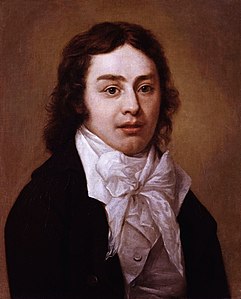Love
Samuel Taylor Coleridge 1772 (Ottery St Mary) – 1834 (Highgate)
All thoughts, all passions, all delights,
Whatever stirs this mortal frame,
All are but ministers of Love,
And feed his sacred flame.
Oft in my waking dreams do I
Live o'er again that happy hour,
When midway on the mount I lay,
Beside the ruined tower.
The moonshine, stealing o'er the scene
Had blended with the lights of eve ;
And she was there, my hope, my joy,
My own dear Genevieve !
She leant against the arméd man,
The statue of the arméd knight ;
She stood and listened to my lay,
Amid the lingering light.
Few sorrows hath she of her own,
My hope ! my joy ! my Genevieve !
She loves me best, whene'er I sing
The songs that make her grieve.
I played a soft and doleful air,
I sang an old and moving story--
An old rude song, that suited well
That ruin wild and hoary.
She listened with a flitting blush,
With downcast eyes and modest grace ;
For well she know, I could not choose
But gaze upon her face.
I told her of the Knight that wore
Upon his shield a burning brand ;
And that for ten long years he wooed
The Lady of the Land.
I told her how he pined : and ah !
The deep, the low, the pleading tone
With which I sang another's love,
Interpreted my own.
She listened with a flitting blush,
With downcast eyes, and modest grace ;
And she forgave me, that I gazed
Too fondly on her face !
But when I told the cruel scorn
That crazed that bold and lovely Knight,
And that he crossed the mountain-woods,
Nor rested day nor night ;
That sometimes from the savage den,
And sometimes from the darksome shade,
And sometimes starting up at once
In green and sunny glade,--
There came and looked him in the face
An angel beautiful and bright ;
And that he knew it was a Fiend,
This miserable Knight !
And that unknowing what he did,
He leaped amid a murderous band,
And saved from outrage worse than death
The Lady of the Land !
And how she wept, and clasped his knees ;
And how she tended him in vain--
And ever strove to expiate
The scorn that crazed his brain ;--
And that she nursed him in a cave ;
And how his madness went away,
When on the yellow forest-leaves
A dying man he lay ;--
His dying words--but when I reached
That tenderest strain of all the ditty,
My faultering voice and pausing harp
Disturbed her soul with pity !
All impulses of soul and sense
Had thrilled my guileless Genevieve ;
The music and the doleful tale,
The rich and balmy eve ;
And hopes, and fears that kindle hope,
An undistinguishable throng,
And gentle wishes long subdued,
Subdued and cherished long !
She wept with pity and delight,
She blushed with love, and virgin-shame ;
And like the murmur of a dream,
I heard her breathe my name.
Her bosom heaved--she stepped aside,
As conscious of my look she stepped--
The suddenly, with timorous eye
She fled to me and wept.
She half enclosed me with her arms,
She pressed me with a meek embrace ;
And bending back her head, looked up,
And gazed upon my face.
'Twas partly love, and partly fear,
And partly 'twas a bashful art,
That I might rather feel, than see,
The swelling of her heart.
I calmed her fears, and she was calm,
And told her love with virgin pride ;
And so I won my Genevieve,
My bright and beauteous Bride.
Font size:
Submitted on May 13, 2011
Modified on March 23, 2023
- 2:57 min read
- 154 Views
Quick analysis:
| Scheme | xaba cded xfxf xgeg hfxf xixi JKxk xlmL xhbh JKxk xgxg xnxn kgxg xlxL xoxo xexe xixi xfxf xpmp gaxa qrcr xkxk xsis xqfq |
|---|---|
| Closest metre | Iambic tetrameter |
| Characters | 3,192 |
| Words | 586 |
| Stanzas | 24 |
| Stanza Lengths | 4, 4, 4, 4, 4, 4, 4, 4, 4, 4, 4, 4, 4, 4, 4, 4, 4, 4, 4, 4, 4, 4, 4, 4 |
Translation
Find a translation for this poem in other languages:
Select another language:
- - Select -
- 简体中文 (Chinese - Simplified)
- 繁體中文 (Chinese - Traditional)
- Español (Spanish)
- Esperanto (Esperanto)
- 日本語 (Japanese)
- Português (Portuguese)
- Deutsch (German)
- العربية (Arabic)
- Français (French)
- Русский (Russian)
- ಕನ್ನಡ (Kannada)
- 한국어 (Korean)
- עברית (Hebrew)
- Gaeilge (Irish)
- Українська (Ukrainian)
- اردو (Urdu)
- Magyar (Hungarian)
- मानक हिन्दी (Hindi)
- Indonesia (Indonesian)
- Italiano (Italian)
- தமிழ் (Tamil)
- Türkçe (Turkish)
- తెలుగు (Telugu)
- ภาษาไทย (Thai)
- Tiếng Việt (Vietnamese)
- Čeština (Czech)
- Polski (Polish)
- Bahasa Indonesia (Indonesian)
- Românește (Romanian)
- Nederlands (Dutch)
- Ελληνικά (Greek)
- Latinum (Latin)
- Svenska (Swedish)
- Dansk (Danish)
- Suomi (Finnish)
- فارسی (Persian)
- ייִדיש (Yiddish)
- հայերեն (Armenian)
- Norsk (Norwegian)
- English (English)
Citation
Use the citation below to add this poem to your bibliography:
Style:MLAChicagoAPA
"Love" Poetry.com. STANDS4 LLC, 2024. Web. 18 Apr. 2024. <https://www.poetry.com/poem/34280/love>.



Discuss the poem Love with the community...
Report Comment
We're doing our best to make sure our content is useful, accurate and safe.
If by any chance you spot an inappropriate comment while navigating through our website please use this form to let us know, and we'll take care of it shortly.
Attachment
You need to be logged in to favorite.
Log In